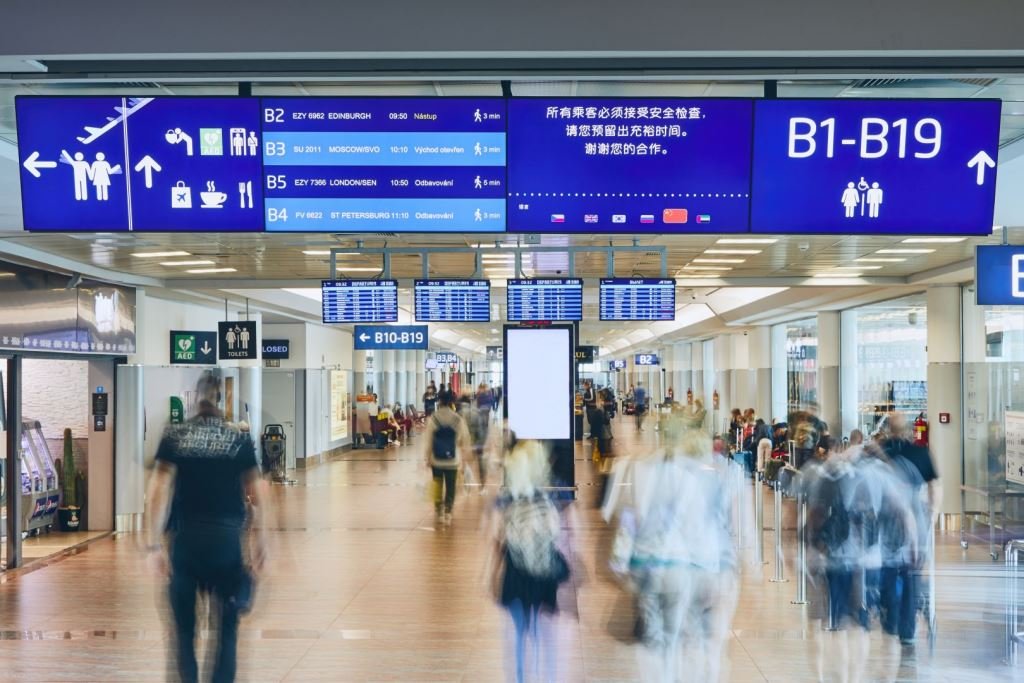AI in Travel
Mobile, UPI, and AI Drive India’s Digital Travel Evolution

India’s travel industry is undergoing a sweeping digital transformation, with mobile-first booking, UPI integration, and AI-driven personalization reshaping how millions of travelers plan and book their journeys. This shift is redefining convenience, speed, and user experience nationwide — powered by the widespread use of smartphones, smart payment systems like the Unified Payments Interface (UPI), and advanced AI technologies.
According to Wego — the leading travel app and the largest online travel marketplace in the Middle East and North Africa — India’s travel ecosystem is rapidly evolving toward smarter, tech-driven solutions that reflect the changing expectations of modern Indian travelers. Wego is actively supporting this transformation through localized innovations designed around user behavior.
Travel in a Tap
With smartphone penetration in India exceeding 750 million users and internet access rapidly expanding in both urban and rural areas, mobile apps have become the primary tool for planning and booking trips. From metro hubs to tier-two cities, travelers now expect a fast and seamless experience that enables them to discover, compare, and book options with just a few taps.
Mobile usage has redefined the travel booking landscape. Smart applications now offer powerful search tools, real-time comparisons, and intelligent filters that help users secure the best deals effortlessly — making the mobile experience a top priority.
Wego’s platform is built around this mobile-centric usage, featuring intuitive search tools, real-time comparisons for flights and hotels, and intelligent filtering systems that empower users to secure the best travel deals in seconds. By aligning with this shift, Wego has positioned itself as the ultimate travel companion for India’s mobile-first generation.
“Mobile is no longer just a channel, it’s the foundation of travel discovery in India,” said Bernard Corraya, General Manager of Wego India. “Our goal is to make that discovery fast, relevant, and seamless for every traveler.”
UPI is Redefining the Payment Experience
The rapid adoption of India’s UPI — now processing over 10 billion transactions monthly — has revolutionized digital payments and reshaped traveler expectations around speed, simplicity, and security. With digital payment usage growing more than 50% annually, instant and secure in-app transactions have become essential, especially among younger and tech-savvy travelers.
In-app integration with UPI enables users to complete bookings without redirects or extra steps. This frictionless process not only boosts convenience but also builds trust, making it easier than ever to finalize travel purchases with confidence.
Artificial Intelligence Drives Personalization
Artificial intelligence is transforming travel into a personalized, dynamic experience. Intelligent systems analyze user behavior, preferences, real-time demand, and seasonal patterns to deliver predictive pricing, curated destination suggestions, and tailored itineraries. This approach is especially impactful in India’s diverse travel landscape, where preferences vary by region, age group, and travel purpose.
Through its intelligent recommendation engine, Wego helps travelers explore both iconic and trending destinations across the country — from the timeless beauty of the Taj Mahal in Agra, to the vibrant beaches and nightlife of Goa, and the serene backwaters of Kerala. The app curates suggestions based on user interests, search behavior, and seasonal trends, ensuring every traveler finds the right destination at the right time.
Corraya added: “Whether someone is planning a family holiday or a quick business trip, our technology surfaces options that are timely and relevant, reducing friction and increasing satisfaction.”
The Future of Travel
India’s travel and tourism sector is evolving rapidly as digital adoption spreads across all demographics. Personalized recommendations, instant payments, and seamless mobile experiences are redefining how journeys are planned and booked. In response, service providers are moving beyond transactional models to create intelligent ecosystems — systems that adapt in real time, anticipate user needs, and offer travelers a more intuitive and empowered experience. With rising incomes, improved connectivity, and growing domestic mobility, India’s travel market is well-positioned for continued growth.
In this landscape, digital platforms like Wego will play a pivotal role in creating a more intuitive, seamless, and personalized future for travel in India.
AI in Travel
When AI Deepfakes Send Tourists Chasing Illusions – Open Jaw
AI in Travel
How many Aussies are using AI to plan travel, who’s utilising it & what exactly are they using it for?

Nearly a third of Aussies are now using artificial intelligence (AI) to help plan their holidays, according to new research from Compare the Market.
In a survey of over 1,000 Australian adults, three in ten (28.8%) respondents said they relied on AI tools to lock in travel deals, scout destinations and find activities.
More than one in ten (11.5%) are specifically using AI for destination recommendations – the most popular use of AI in travel – while a similar number (10.3%) are seeking out deals.
Meanwhile, nearly one in ten (9.4%) look for recreational activities and accommodation, while one in 11 (9%) use AI to create itineraries, and nearly the same number (8.2%) search for flights and transport. A small percentage (3.2%) use AI to understand currency conversion.
“Australians love a good holiday and have never been afraid to ask for help when planning the perfect getaway,” Compare the Market’s Chris Ford says.
“Our latest data highlights a shift in the way travellers are approaching their planning, with convenience, personalisation and speed driving the adoption of innovative AI tools.”
When it comes to who’s using the technology, the survey reveals a clear generational divide.
The study found that, unsurprisingly, Gen Z and Millennials are the most likely to engage with AI when planning a trip.
On the other hand, the vast majority (93%) of Baby Boomers and three-quarters (76%) of Gen Xers said they’ve never used AI tools to help book a holiday.
Interestingly, Gen Z and Gen X lean on AI for destination recommendations, Millennials for recreational activities, and Baby Boomers primarily for accommodation.
Advice, but not an advisor
While AI adoption isn’t surprising, Ford cautions that it should be treated as a tool, not a travel agent – and travellers should always sense-check recommendations.
“It’s likely that travellers are using these tools in addition to chatting with travel agents, conducting desktop research or seeking ideas and inspiration from social media,” he notes.
Despite being a “great starting point” in the overall journey, Ford says that it’s important to “always ensure you’re crossing your ‘t’s and dotting your ‘I’s” when using AI.
“Many of these tools and services are still in their infancy stage and may not be 100% accurate, so do your own research to ensure you’re equipped with the right tools and information for your trip,” he states.
“The last thing we want to see is anyone getting themselves into a potentially dangerous or unsafe situation based on the recommendations from AI.”
With this in mind, Ford also reminds travellers not to overlook insurance.
“Travel insurance is designed to protect you against unexpected events when you’re travelling domestically or internationally and AI may not be forthcoming with these types of incidents,” he says.
“The type of cover offered by insurers can vary, but consider policies that cover scenarios for the kind of holiday you’re booking.”
Where AI “falls short”
Karryon Features Editor Gaya Avery says while AI handles bookings, great travel agents go further — acting as trusted advisors, curators and problem-solvers.
“They don’t just book travel – they shape it, tailoring experiences to each client’s needs. That’s where artificial intelligence falls short,” she said.
“Travel professionals provide value: personalised service, insider knowledge and human connections that AI simply can’t replicate.”
So does high AI uptake mark the death of the travel agent? Get Gaya’s take on the technology from earlier this year here.
AI in Travel
Booking.com Releases The Global AI Sentiment Report

- 91% of global respondents say they are excited about AI and 79% are familiar with the technology, though levels vary across regions.
- Despite widespread enthusiasm, only 6% fully trust AI and the majority (91%) have at least one concern about its implications.
- Only 12% of consumers are comfortable with AI making decisions independently, highlighting a clear boundary when it comes to fully handing over control to automation.
- 89% of consumers want to use AI in future travel planning, with AI assistants (24%) now considered a more trusted source than travel bloggers (19%) or social media influencers (14%).
AMSTERDAM – Today, Booking.com released The Global AI Sentiment Report, drawing on insights from over 37,000 consumers across 33 markets to explore how people are using, trusting, and responding to AI in everyday life and travel. As both the public and private sectors accelerate investments in AI, Booking.com, a leading digital travel platform that has integrated AI into its services for over a decade, is committed to shaping the future of travel technology in line with evolving consumer attitudes.
With excitement around AI at a peak and innovation increasing at rapid pace, Booking.com is harnessing this momentum to redefine how people search for, book, and experience travel, advancing its mission to make it easier for everyone to experience the world. The report reveals a nuanced picture: 91% of consumers express excitement about AI, 79% are familiar with the technology, and 89% want to use AI in their future travel plans. Yet, there are significant regional differences: while some embrace AI’s potential, others approach it with caution, underscoring the need for responsible implementation that balances opportunity with consumer trust. These new insights and perspectives will help shape the next chapter of AI in travel and beyond.
Sentiment Breakdown
Booking.com’s new research identified clear cohorts among global consumers, reflecting diverse AI sentiment: over one-third (36%) identify as AI Enthusiasts, intrigued by AI’s potential, while 13% are AI Advocates, actively championing its benefits and responsible adoption. This enthusiasm is grounded in the belief that AI will make life easier (69%), save time and effort (51%), enhance productivity (40%), and expand learning opportunities (48%).
However, this excitement coexists with significant caution. While 91% express enthusiasm for AI, an equal proportion report at least one concern about its broader implications. Approximately 13% classify themselves as AI Cautious, wary of AI’s development or use, and 9% as AI Skeptics. Notably, one in four respondents (25%) identify as AI Detractors, signaling a meaningful segment resistant to AI adoption.
Mapping the AI Mindset: Regional Variations
Significant regional differences emerge in consumer attitudes toward AI. Latin America (LATAM) leads globally in enthusiasm and familiarity, with 98% of respondents excited about AI and 89% understanding how it works. The Asia Pacific (APAC) region follows closely, showing the highest willingness to integrate AI into daily life-41% use AI for education and the same share for transport.
North America (NORAM) and Europe & Middle East (EME), on the other hand, emerge as skeptical strongholds, approaching AI with more caution and distrust. Globally, while 77% have at least some trust in AI, nearly a quarter (23%) rarely or never trust information generated by it- with distrust highest in these two regions (32% in NORAM and 29% in EME). Consumers here are also more likely to fact-check AI outputs, highlighting a broader demand for transparency and reassurance as adoption grows.
Assistance Over Autonomy
AI has become deeply integrated into daily life, with 98% using AI-powered search, 86% using streaming recommendations, and 77% engaging with generative AI tools. Yet, the lack of a human touch generates doubts with 35% finding AI impersonal, and the majority double-checking AI outputs even when they trust the technology: 42% always fact-check, and 29% do so sometimes. Only 6% of consumers fully trust AI.
This hesitation creates a clear boundary: most people are not ready to cede full decision-making to AI. Just 12% feel comfortable with AI making decisions independently, while 25% remain unsure, and 10% feel very uncomfortable, refusing to trust AI without human approval. The greatest opportunity lies in positioning AI as a supportive tool that enhances, rather than replaces, human judgment.
AI’s Advancing Role in Travel
AI is rapidly becoming a core part of the travel experience, with 65% of consumers expecting autonomous trip planning to go mainstream in the near future. Two in three (67%) have already used AI in some aspect of travel, and of those, nearly all have turned to it for planning or booking (98%) or while already on a trip (96%). This reflects both the growing reliance on AI-powered tools and travelers’ openness to technology that enhances their journeys.
When planning a trip, travelers most often use AI to research destinations and the best time to visit (38%), find local experiences or cultural activities (37%), and get restaurant recommendations (36%). Notably, today, AI assistants are emerging as a more trusted source for planning travel (24%) than colleagues (19%) or influencers (14%).
Once in-trip, AI tools are most commonly used for translation capabilities (45%), in-destination activity suggestions (44%), restaurant recommendations (40%), and navigating unfamiliar locations or transport systems (40%). After returning home, the top AI use case is photo editing, cited by 38% of respondents.
Beyond making travel easier and more efficient, a benefit 66% of travelers recognize, there is also a strong desire for AI to serve as a force for good. The majority (71%) appreciate AI-generated recommendations that help them avoid overcrowded destinations or peak travel times. Travelers are increasingly mindful of community impact, with 60% wanting AI to highlight experiences that positively benefit the local places they visit.
Generative AI represents one of the most significant technological shifts of our era, fundamentally reshaping how consumers engage with the world around them. As this technology matures, it’s not only transforming how companies like ours anticipate and meet evolving customer needs, it’s also raising the bar for what travelers expect from every interaction.
The opportunity ahead is tremendous. At Booking.com, we’ve long been at the forefront of AI innovation, integrating advanced machine learning to enhance the customer journey at every touchpoint. But as we enter this next phase, our responsibility goes beyond technology. Building trust, ensuring transparency, and prioritizing safety are critical as we guide travelers, and our industry, into the future.
James Waters, Chief Business Officer at Booking.com
Booking.com’s The Global AI Sentiment Report can be accessed here.
Methodology:
This global quantitative research study was conducted via an online questionnaire between April and May 2025, gathering responses from 37,325 people across 33 markets. Argentina: 1012, Australia: 1013, Austria: 500, Belgium: 1000, Brazil: 2006, Canada: 1007, China: 2018, Colombia: 1023, Croatia: 509, Denmark: 508, France: 2031, Germany: 2033, Hong Kong: 1006, India: 2004, Ireland: 504, Israel: 505, Italy: 1000, Japan: 1029, Mexico: 2014, Netherlands: 1008, New Zealand: 1015, Portugal: 1013, Singapore: 1002, South Korea: 1006, Spain: 1006, Sweden: 502, Switzerland: 501, Taiwan: 1022, Thailand: 1002, UAE: 513, UK: 2005, USA: 2004, Vietnam: 1004. As a leading digital travel platform exploring the role of AI, Booking.com conducted this study to better understand how people around the world are using, trusting, and responding to AI in both everyday life and travel.
About Booking.com
Part of Booking Holdings Inc. (NASDAQ: BKNG), Booking.com’s mission is to make it easier for everyone to experience the world. By investing in the technology that helps take the friction out of travel, Booking.com’s marketplace seamlessly connects millions of travelers with memorable experiences every day. For more information, follow @bookingcom on social media or visit globalnews.booking.com. For more information, follow @bookingcom on social media or visit globalnews.booking.com.
Press Office Booking.com
+31 20 709 4743
Booking.com
-

 Brand Stories2 days ago
Brand Stories2 days agoBloom Hotels: A Modern Vision of Hospitality Redefining Travel
-

 Brand Stories2 days ago
Brand Stories2 days agoOlive Living: India’s Intelligent, Community-Centric Hospitality Powerhouse
-

 Destinations & Things To Do3 days ago
Destinations & Things To Do3 days agoUntouched Destinations: Stunning Hidden Gems You Must Visit
-

 AI in Travel3 days ago
AI in Travel3 days agoAI Travel Revolution: Must-Have Guide to the Best Experience
-

 Brand Stories3 weeks ago
Brand Stories3 weeks agoVoice AI Startup ElevenLabs Plans to Add Hubs Around the World
-

 Brand Stories2 weeks ago
Brand Stories2 weeks agoHow Elon Musk’s rogue Grok chatbot became a cautionary AI tale
-

 Asia Travel Pulse3 weeks ago
Asia Travel Pulse3 weeks agoLooking For Adventure In Asia? Here Are 7 Epic Destinations You Need To Experience At Least Once – Zee News
-

 AI in Travel3 weeks ago
AI in Travel3 weeks ago‘Will AI take my job?’ A trip to a Beijing fortune-telling bar to see what lies ahead | China
-

 Brand Stories3 weeks ago
Brand Stories3 weeks agoChatGPT — the last of the great romantics
-

 Brand Stories2 weeks ago
Brand Stories2 weeks agoHumans must remain at the heart of the AI story


You must be logged in to post a comment Login